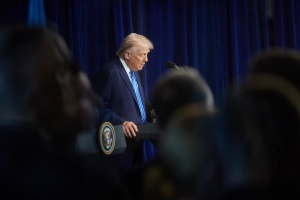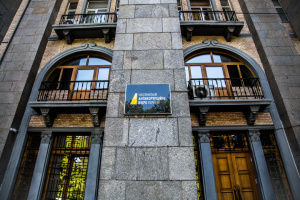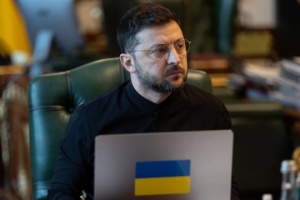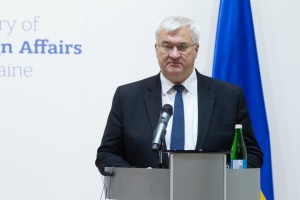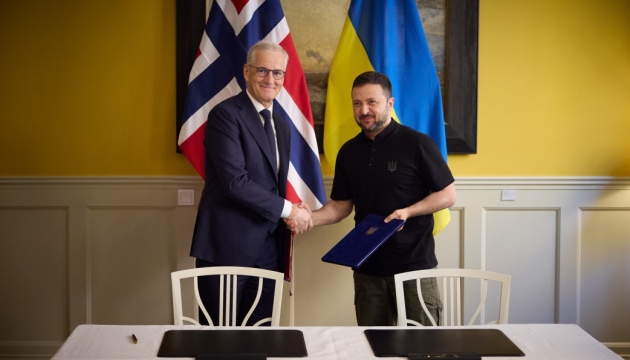
Ukraine, Norway have signed security cooperation pact
Ukrinform gives here the full text of the agreement as quoted by President Zelensky’s official website.
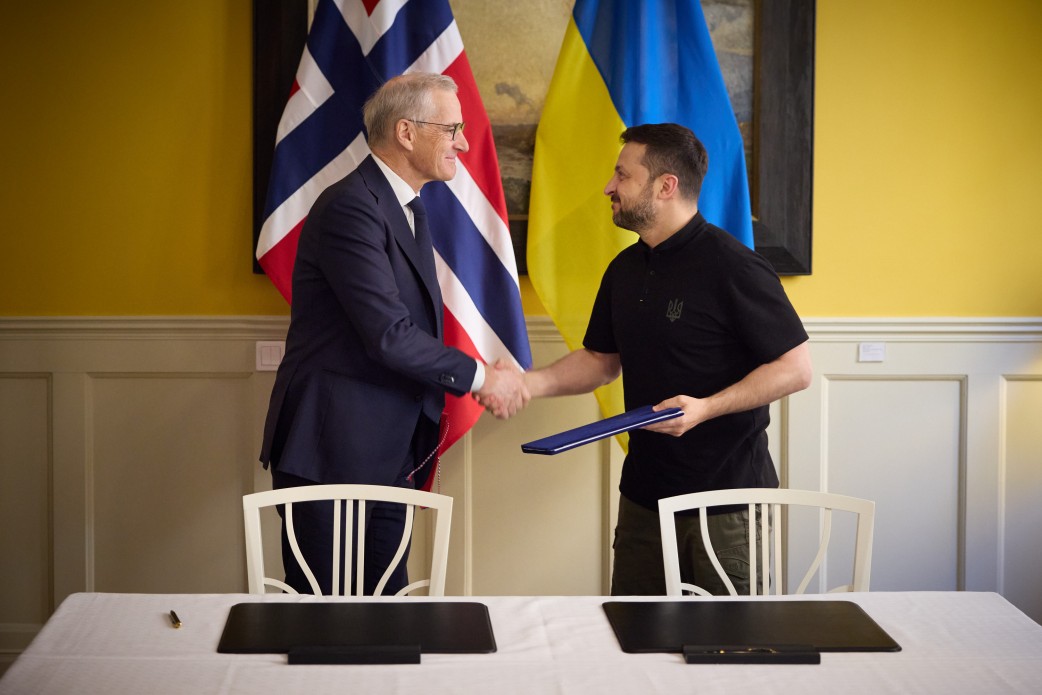
Agreement on Security Cooperation and Long-Term Support between Ukraine and the Kingdom of Norway
31 May 2024 - 13:54
Ukraine and the Kingdom of Norway, hereinafter ‘the Participants’ or ‘Ukraine and Norway’, condemn in the strongest possible terms the unjustified, unprovoked, illegal, and brutal war of aggression by Russia against Ukraine, by which Russia seriously violates international law, including the United Nations Charter.
Norway is unwavering in its commitment to Ukraine's independence, sovereignty, and territorial integrity within its internationally recognised borders as of 1991, including the territorial sea.
Norway fully recognises the perseverance and spirit of the Ukrainian people as they continue to show extraordinary determination. Ukraine is exercising its inherent right of self-defence as enshrined in Article 51 of the UN Charter. Ukraine’s self-defence against Russian aggression is also a fight for democratic values and European security – and is therefore also vital for Norwegian interests and Norway’s security.
The Participants are committed to common values of democracy, the rule of law, good governance, and respect for human rights and fundamental freedoms. They reaffirm the principles of the UN Charter, the Helsinki Final Act, and the Charter of Paris, including the independence, sovereignty and territorial integrity of states, and the inviolability of borders, which are essential to European and global security.
The Participants will together continue to strive for a comprehensive, just, and lasting peace for Ukraine as well as peace, security and stability on the European continent.
The Participants reaffirm their support for the ongoing reform efforts to strengthen Ukraine’s security and economy, aimed at realising Ukraine’s European and Euro-Atlantic aspirations, including its future European Union and NATO membership.
The Participants have jointly determined to strengthen security cooperation through bilateral security commitments and long-term support measures as set out in this Agreement.
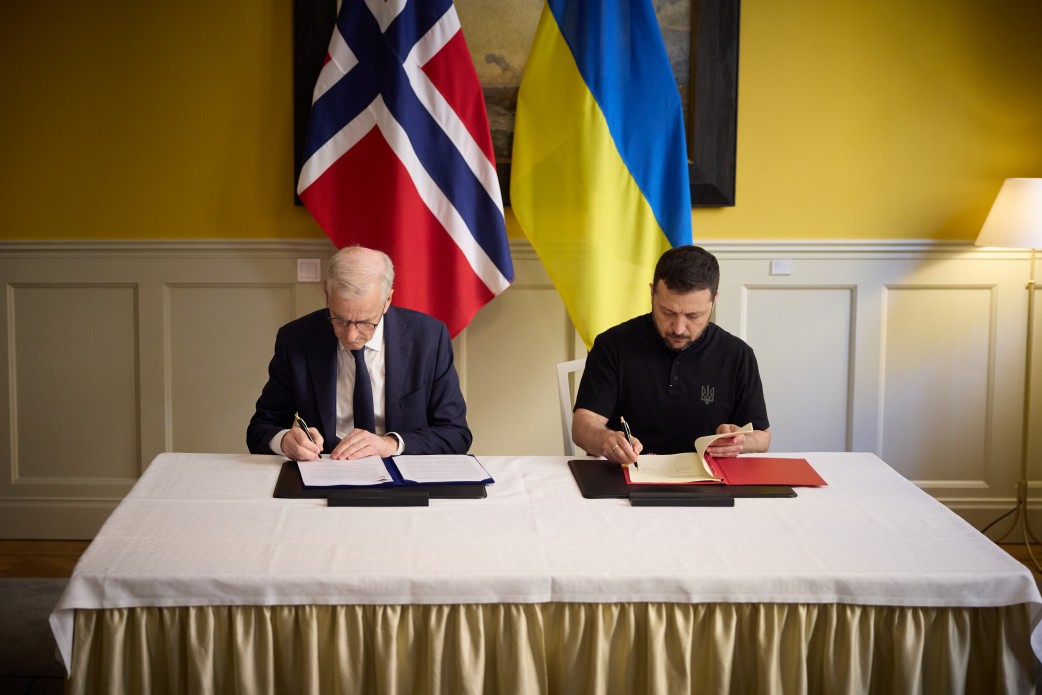
I. Scope
1. This Agreement is intended to further the objectives set out in the Joint Declaration of Support for Ukraine, launched by the Group of Seven (G7) in Vilnius on 12 July 2023 and joined by Norway, together with the Nordic countries. In a joint Nordic statement, the Nordic countries reiterated their commitment to support Ukraine as it defends its sovereignty and territorial integrity, rebuilds its economy, protects its citizens, and advances its reform agenda, as it pursues its integration into the Euro-Atlantic community.
2. Hereby, Ukraine and Norway have decided to deepen their cooperation and partnership, which is based on their common interests in the defence of international law and order, peace, and the protection of fundamental human rights and freedoms.
3. Norway remains committed to providing unwavering and substantial support for Ukraine for as long as it takes for Ukraine to prevail. Norwegian support includes military, civilian and humanitarian assistance to help Ukraine defend itself against Russia’s war of aggression, to restore its territorial integrity within its internationally recognised borders, to secure its free and democratic future, to enable Ukraine to continue providing services to its people, to meet humanitarian needs, to uphold a functioning economy, and to deter future Russian aggression.
4. Norway firmly believes that the future of Ukraine and its people lies within the Euro-Atlantic community. Ukraine and Norway will continue to work jointly towards Ukraine’s future NATO membership. Norway recognises that Ukraine has the right to independently choose its own security arrangements. The security of Ukraine is of great importance to Norway and NATO, as demonstrated by intensified political and practical cooperation.
II. Comprehensive and long-term support to Ukraine
1. Norway will continue to provide extensive military and civilian support and humanitarian assistance to Ukraine through the Nansen Support Programme for Ukraine (Nansen Support Programme). In addition to the roughly NOK 11 billion (equal to approximately EUR 940 million as of May 2024) provided following Russia’s full-scale invasion on 24 February 2022, Norway is providing NOK 75 billion (equal to approximately EUR 6.4 billion as of May 2024) for the five-year period 2023–2027 under the Nansen Support Programme. In 2024, Norway’s military support will amount to at least NOK 13.5 billion (equal to approximately EUR 1.2 billion as of May 2024). This does not preclude any additional support.
2. Norway’s commitment to provide support to Ukraine over the five-year period covered by the Nansen Support Programme has the backing of all the political parties represented in the Storting (Norwegian parliament) and sends a clear message to the Ukrainian people and the international community that Norway will stand by Ukraine in the long term.
3. Norway’s support is based on Ukraine’s needs and is coordinated with other international efforts. Within the total of NOK 75 billion under the Nansen Support Programme, allocations are to be determined annually and can be adjusted during the year. The same applies to the amount of funding to be distributed between military and civilian support.
4. The Nansen Support Programme allows for assessments and adjustments as Ukraine’s needs evolve. The goal for Norway is to provide the most effective and flexible support possible for Ukraine as it defends itself, and on its course towards future membership in the EU and NATO.
5. Norway will continue its multifaceted support to Ukraine for the ten-year duration of this Agreement. Norway recalls that national budgetary provisions apply and require explicit authorisation from the Storting.
III. Military assistance, security and defence cooperation
1. Since the start of Russia’s full-scale war of aggression, Norway has made substantial military contributions to Ukraine, including main battle tanks, armour, artillery, rocket artillery, artillery radars, ammunition, air defence systems, mine clearance equipment, anti-tank weapons, drones, and winter gear.
2. The Participants recall the inherent right of states to self-defence, and the unlawfulness of all attempts to redraw borders by force. They reaffirm that Ukraine’s security is integral to Euro-Atlantic and global security. Ukraine’s security and defence forces are defending not only Ukraine’s state sovereignty, independence and territory but also the UN Charter, our shared values and fundamental principles of international law.
3. Norway is determined to support Ukraine as an independent, democratic, and sovereign state, within its internationally recognised borders, capable of deterring and defending itself against future attacks, as well as in the effort to deepen Ukraine’s interoperability with NATO and to accelerate Ukraine’s transition to NATO equipment and standards. The Participants share the aim of establishing modern, interoperable, and sustainable Ukrainian Defence Forces, including, but not limited to future force design.
4. Ukraine will ensure that Norwegian military assistance is used exclusively for Ukraine’s self-defence and is used by the security and defence forces of Ukraine for military objectives in accordance with international law, including international humanitarian law. The Participants will cooperate to prevent the diversion and the illegal circulation of defence materiel provided to Ukraine.
5. Norway intends to continue to provide short-term support to Ukraine with the aim of enabling Ukraine to repel Russian aggression and will continue to provide long-term support to help Ukraine defend itself effectively, for as long as it takes. Contributions are aimed at meeting Ukraine’s priority needs for military support in all warfighting domains (land, air, sea, space, cyber, and the electromagnetic spectrum). Norway is closely coordinating military support with Ukraine, allies, and partners.
6. Norway’s military assistance to Ukraine is focused on maritime security, integrated air and missile defence, and combat aircraft. Norway will actively explore areas of additional support, including potential future donations of ammunition.
7. Norway is committed to continuing extensive training of Ukrainian security and defence forces, including train-the-trainer programmes, through international and bilateral initiatives, while also contributing to modernising military education systems to align with NATO principles and standards.
8. The Participants will cooperate to counter threats to maritime security, and to ensure full adherence to the United Nations Convention on the Law of the Sea. The Participants will coordinate their efforts on strengthening international cooperation and coordination in the domain of maritime security, with the aim of eliminating threats and increasing the level of maritime security in the world.
9. Norway will, together with the United Kingdom, lead the Maritime Security Capability Coalition and will make significant contributions to Ukraine’s maritime capabilities. The Maritime Security Capability Coalition aims to support Ukraine with a view to the country becoming a net contributor to maritime security across the Black Sea and the Azov Sea. This will help Ukraine to deter and repel threats, restore economic activity, and move Ukraine towards interoperability with NATO in the maritime sphere.
10. Norway will continue to provide Ukraine with integrated air and missile defence systems, including NASAMS. Norway will aim to further improve the effectiveness of these systems through the donation of materiel, training of personnel, and continual systems development.
11. In close cooperation with allies, Norway will aid Ukraine in developing modern combat aircraft capability, centred around the F-16 system. Norway is contributing to the training and education of Ukrainian personnel on the F-16 system and is already providing instructors and F-16 jets for this purpose. Norway will donate F-16 fighter jets to Ukraine.
12. The Norwegian Government is working to strengthen the production capacity of the Norwegian defence industry through national and international measures, including in cooperation with the EU. This will enhance Ukrainian, Norwegian, and Euro-Atlantic security.
13. Ukraine and Norway will work on deepening their defence industrial cooperation. Special attention will be given to preserving the military edge Ukraine requires in its self-defence against Russia’s full-scale war of aggression. The Participants will work together to identify priority investment areas, strengthen efforts to reduce existing barriers for cooperation, and eliminate bottlenecks in the supply chain of defence materiel, as well as to encourage and support investments. Norway has made policy changes to facilitate increased defence industry cooperation and direct sales of military equipment to Ukraine.
14. Norway will be open to the possibility of its defence industry localising production and/or sustainment of critical systems in Ukraine, in accordance with Norwegian export control regulations. Norway will work with Ukraine to explore possibilities for research and development (R&D) and technology exchange between Ukrainian and Norwegian R&D entities and defence industries. The Participants will work together to facilitate the protection of any transferred technologies and intellectual property rights.
15. Norway will work with Ukraine to identify funding sources required to enable development of Ukraine’s defence industrial base, which will include providing Norwegian investments and financial assistance, in particular while the war is ongoing and during post-war recovery.
16. Norway will support Ukraine’s efforts to integrate its defence industry into NATO defence and security frameworks.
17. The Participants will cooperate to enable Ukraine to protect digital infrastructure, and to prevent, detect and counter Russian cyber aggression, cyber espionage, and other hybrid warfare threats, including through increased cooperation on cyber diplomacy. The Participants intend to continue to learn from each other and support each other to strengthen resilience in the face of hybrid challenges. Norway will continue to support initiatives within NATO and relevant international organisations to counter hybrid threats.
IV. Civilian support
1. Norway will continue to provide civilian support to Ukraine under the Nansen Support Programme as part of a broad international effort based on Ukraine’s needs. Multilateral organisations, international financial institutions, and other forums, such as the G7 Multi-agency Donor Coordination Platform for Ukraine, and the Humanitarian Senior Officials Meeting (SOM) on Ukraine, play key roles in the coordination of international civilian support. Norway is committed to supporting Ukraine in numerous areas, including, but not limited to:
a. Budget support provided through established multilateral channels to help maintain critical government functions and services to keep Ukrainian society up and running.
b. Nuclear safety, continuing the long-term Ukrainian-Norwegian cooperation in reducing the risk of nuclear accidents and radioactive pollution. The Participants condemn Russia’s illegal seizure of the Zaporizhzhia Nuclear Power Plant, which further increases risks and threats in the sphere of nuclear security worldwide. The Participants call for the urgent withdrawal of all unauthorised military and other personnel from Ukraine’s Zaporizhzhia Nuclear Power Plant and for its return to the full control of Ukraine.
c. Enhancing the protection, resilience, and restoration of critical infrastructure, including efforts to ensure the population’s access to electricity, heat, water, health care, education, and other basic services.
d. Energy security, energy sector reform and measures to further the green transition, which are crucial to strengthening Ukraine’s resilience.
e. Business and industry-related support, including contributions to guarantee and insurance mechanisms (European Bank for Reconstruction and Development - EBRD, Multilateral Investment Guarantee Agency - MIGA), and mechanisms to support increased mobilisation of private investments in Ukraine.
f. Democracy and human rights-related support, including support to Ukrainian civil society.
g. Humanitarian assistance through the UN, the International Committee of the Red Cross (ICRC), and humanitarian organisations to provide food, water, health care, heating, shelter, and education to the most vulnerable people in Ukraine.
h. Substantial funding to humanitarian demining efforts alongside partners to make it safer to move around and to enable farmers to once again cultivate their crops. Given the extraordinary scope of the challenge caused by Russia’s massive contamination of Ukrainian soil through mines, ammunition and other explosive ordnance, Norway, in cooperation with other partners, will support Ukraine, in particular the State Emergency Service of Ukraine, in developing and sustaining international demining standards in its operations.
i. Assistance in the medical evacuation of Ukrainian patients, continuing Norway’s efforts as part of the EU Civil Protection Mechanism. Flights have been provided for the evacuation of thousands of Ukrainian patients and their accompanying family members to various countries in Europe, and hundreds of patients have been transported to receive treatment in Norwegian hospitals.
j. Norway will, together with the EU and international partners, and in close coordination with relevant international organisations and international financial institutions, continue to support Ukraine on its path from early to long-term recovery, and align these efforts with Ukraine’s European perspective. Ukraine and Norway will therefore continue to strengthen the Multi-agency Donor Coordination Platform for Ukraine initiated by the G7 as well as other coordination mechanisms for joint international efforts for reconstruction and to promote the implementation of Ukraine’s reform agenda as well as private sector-led growth.
2. The Participants will continue cooperation in the efforts to counter disinformation by Russia or any other actors. They will jointly promote the development of their capabilities to counter information threats, expose Russian and any other malign propaganda and neutralise disinformation campaigns affecting national security. The Participants will regularly exchange information and best practices in the field of countering disinformation.
V. Political cooperation and bringing Russia to justice
1. The Participants recognise that Ukraine and Europe as a whole will not be secure until there is a just peace that respects Ukraine’s rights as a sovereign state under international law, including the UN Charter. Ukraine and Norway will therefore work together for a comprehensive, just, and lasting peace that has broad international support.
2. Norway welcomes Ukraine’s efforts to achieve a just and sustainable peace, based on the principles of Ukraine’s Peace Formula. Norway will continue to play an active role in implementing initiatives that reflect the principles of the UN Charter. Norway is participating in the working groups of Ukraine’s Peace Formula’s ten points and co-chairs two of them. It is up to Ukraine, as a victim of aggression to define when and on what basis a future peace process should be conducted. Norway will continue to support Ukraine politically in international forums with a focus on Ukraine’s Peace Formula.
Promoting accountability
3. The Participants reaffirm their commitment to holding Russia accountable for causing losses or damage to individuals and entities, as well as to Ukraine, as a result of its internationally wrongful acts in or against Ukraine, including its aggression in violation of the UN Charter. The Participants reaffirm that Russia must bear the legal responsibility, including by making reparations for any damage caused by such acts, which will also help deter future attacks and support Ukraine's recovery.
4. The Participants reaffirm their commitment to ensuring accountability, in accordance with international law, for international crimes committed in connection with Russia’s war of aggression against Ukraine, including by supporting the work of the Office of the Prosecutor General of Ukraine. The Participants will continue to promote effective domestic investigation and prosecution of international crimes within Ukraine and will continue to support the work of the International Criminal Court to ensure allegations of war crimes are fully and fairly investigated by independent, effective, and robust legal mechanisms.
5. The Participants reaffirm that there must be no impunity for war crimes and other atrocities. The Participants share the conviction that it is essential to ensure accountability for the crime of aggression against Ukraine. Therefore, the Participants will continue their engagement in the Core Group on options for the establishment of a tribunal on the crime of aggression against Ukraine.
Compensation for damage, loss or injury caused by Russia's aggression
6. The Participants reaffirm that Russia is to be held accountable for the damage inflicted on Ukrainian territory and must pay for the long-term reconstruction of Ukraine. Russian sovereign assets should remain immobilised until the Russian Federation has paid for the damage it has caused to Ukraine. Norway, working with international partners, aims to continue to pursue all lawful routes through which Russian assets and revenues thereof can be used to support Ukraine, in accordance with European and international law.
7. The Participants recognise the need for, and will continue to work together along with G7 and other states towards the establishment of an international compensation mechanism to provide compensation for damage, loss or injury caused by Russian aggression, as envisaged by the Statute of the Register of Damage Caused by the Aggression of the Russian Federation against Ukraine adopted by the Resolution of the Committee of Ministers of the Council of Europe CM/Res(2023)3. The Participants will, in accordance with their respective legal systems and international law, continue to work together with international partners to explore all possible avenues for the financing of a compensation mechanism, to aid Ukraine in obtaining compensation from Russia and providing prompt and adequate compensation to victims of aggression.
Sanctions
8. The Participants will continue working to ensure that the costs to Russia for its aggression continue to rise, including through sanctions and export controls. The Participants recognise the value of sanctions in restricting Russia’s access to the finance, goods, technology, and services it is utilising in its aggression, in bearing down on Russia’s revenue streams, and in deterring future attacks, including measures to tackle circumvention of the measures in third countries.
9. Norway will continue to align itself closely with the EU to uphold the pressure on Russia through robust international sanctions, which includes sanctions against sectors of the Russian economy and those in or outside the Russian Federation who are supporting or profiting from the war or assisting in sanctions circumvention in third countries, and to fight the evasion of sanctions as long as Russia’s war of aggression against Ukraine continues and Ukraine’s territorial integrity is not restored. Norway will cooperate with, and support determined action by the EU to tackle all forms of sanctions circumvention.
VI. European and Euro-Atlantic integration. Commitment to implement reforms
1. The Participants reaffirm that inclusive reform is indispensable for Ukraine’s current and future security and prosperity, for its democracy, for the resilience of its institutions and for Ukraine’s European and Euro-Atlantic aspirations, including towards its future EU and NATO membership. The legacy effect created by the war, such as the liberation of the temporarily occupied territory, the transition from martial law, and the need to meet public expectations, will require Ukraine’s institutions to be well adapted to managing such challenges.
2. The Participants reiterate their commitment to streamline reform efforts with the priority reform areas established for accession to the EU and NATO and for meeting IMF benchmarks, as well as to align them with other major donors, in particular international financial institutions and G7 partners. A significant part of the Norwegian civilian support is channelled through trusted international partners such as the World Bank, the EBRD and the UN. The Participants support the work of these organisations, including their focus on sustainability, transparency, good governance and anti-corruption.
3. Norway recognises the significant progress Ukraine has made in implementing reforms.
4. Ukraine reiterates its continued commitment to implement reforms, including in the areas of:
− governance: Ukraine commits to continuing institutional governance reform in the interest of building a resilient and inclusive democracy, including the continued reform of its judiciary with strengthened judicial appointment procedures to build public trust in the rule of law;
− anti-corruption: acknowledging that this transcends all areas of reform, Ukraine commits to continuing to build its capacity to prevent and combat corruption across the public and private sectors as well as civil society, including through supporting independent and well-resourced anti-corruption institutions that are able to operate with appropriate accountability and without political interference;
− economic and business environment: modernising the economy by advancing reforms that will attract private finance, boost investor confidence, combat corruption and create a fair and level playing field for all parties, including through a reform of state-owned enterprises (SOEs);
− respect for human rights, including workers’ participation and media freedom, in order to build a strong and resilient democracy.
5. Norway will continue its support for Ukraine’s ongoing reform efforts and its European path. Norway reiterates its support for Ukraine’s accession to the European Union. Norway reaffirms that Ukraine belongs in the Euro-Atlantic family and will become a member of NATO.
6. Norwegian support for reform and good governance will include a mechanism to support technical cooperation between Ukraine and Norway.
7. Norway recognises the significant progress Ukraine has made in implementing reforms in the security and defence sector. Ukraine reiterates that it will continue to engage in comprehensive democratic reforms in the security and defence sector, ensuring full and equal participation of women at all levels of the decision-making process. Ukraine will continue to advance defence reforms and modernisation, including by strengthening democratic civilian oversight of the security sector, and to improve efficiency and transparency across Ukraine’s defence institutions and industry.
8. Norway will continue to contribute to Ukraine’s security and defence sector reform to promote transparency, accountability and efficiency, and to strengthen democratic civilian control and oversight, taking into account gender as a cross-cutting issue. Norway will continue to support the Ministry of Defence of Ukraine and subsidiary agencies in reforming and strengthening integrity in the security sector, and actively and systematically combating corruption. Norway will explore further prospects for cooperation on defence-sector capacity building through NATO.
VII. Consultation and cooperation in the event of future armed attack
1. Any future Russian invasion of Ukraine would violate the UN Charter and fundamental principles of international law and would seriously undermine Euro-Atlantic security.
2. In the event of future Russian armed attack on Ukraine, at the request of either Participant, the Participants will consult within 24 hours, bilaterally or via other channels they both deem suitable, to determine appropriate next steps. The Participants will seek close coordination with allies and partners.
3. Norway, in such circumstances, and in accordance with its respective legal and constitutional requirements, will provide Ukraine with swift and sustained security assistance, modern military equipment across land, sea and air domains, and economic assistance; impose economic and other costs on Russia, including through aligning itself closely with sanctions decided by the EU; and consult with Ukraine on its needs as it exercises its right of self-defence enshrined in Article 51 of the UN Charter.
4. In order to ensure the widest and most effective response to any future armed attack, Ukraine and Norway may amend these provisions to align with any mechanism that Ukraine may subsequently agree on with its other international partners, including the participants of the G7 Joint Declaration of 12 July 2023.
VIII. Final clauses
1. This Agreement is valid for ten years from the date of its signature.
2. At the same time, in accordance with the G7 Joint Declaration of 12 July 2023, the Participants intend this Agreement to remain in force as Ukraine pursues its path to future membership in the Euro-Atlantic community.
3. To facilitate the implementation of the Agreement, Ukraine and Norway will ensure dialogue on progress and review changes as necessary.
4. The Participants will, if necessary, designate authorised bodies for the development and implementation of bilateral agreements in accordance with the areas of cooperation specified in this Agreement.
5. In the event that Ukraine becomes a member of NATO before the expiry of this Agreement, the Participants will decide on its future status.
6. This Agreement may be terminated by either Participant by giving written notice to the other. The Agreement will be terminated six months from the date of giving such notice.
7. This Agreement may be amended and supplemented, including by adding annexes thereto, by mutual agreement of the Participants, which will be submitted in writing.
8. Any disputes between the Participants arising out of the interpretation and/or implementation of this Agreement will be settled amicably through negotiation or consultation between the Participants.
9. This Agreement will come into effect immediately upon signature.
Signed in Stockholm on 31 May 2024, in duplicate, in the English and Ukrainian languages, the English version of which shall prevail in the event of any discrepancy.
For Ukraine: Volodymyr Zelenskyy, President
For Norway: Jonas Gahr Støre, Prime Minister
Photo via Presidential Press Office

